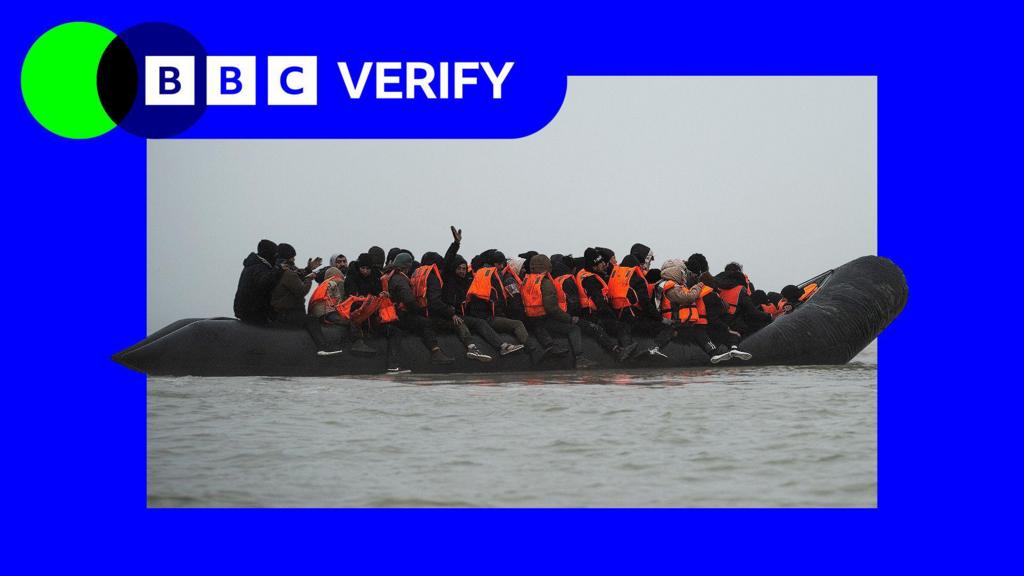Addressing illegal immigration and reforming the asylum system are top priorities for the current government.
The Labour leader, Sir Keir Starmer, has pledged to dismantle criminal gangs facilitating illegal immigration, echoing previous Conservative promises to deter small boat crossings.
Despite these commitments, small boat arrivals have reached record highs this year, with approximately 800 migrants arriving on a single Wednesday.
BBC Verify examines key government pledges, including eliminating asylum hotels and increasing the repatriation of individuals whose asylum claims have been denied.
Labour’s election manifesto promised to “eliminate asylum hotels, saving billions in taxpayer funds“.
The government aims to achieve this by the end of the current parliamentary term (2029), barring an early election.
However, recent data reveals a higher number of asylum seekers in hotels in March 2025 compared to June 2024, just before the general election.
The number increased from 29,585 to 32,345, although it has since decreased from a December peak.
While official figures on the number of hotels used are not regularly released, BBC Verify’s data shows 218 asylum hotels in December, up from 212 in July.
Asylum seekers gain legal protections, including accommodation if needed, upon application.
Almost all small boat arrivals claim asylum, comprising a third of all asylum applications in the past year. Another significant group are visa overstayers already in the UK.
The asylum process assesses whether individuals face a “well-founded fear of persecution” in their home country.
Since 2020, the government’s reliance on hotels has increased due to insufficient alternative accommodation to meet the influx of small boat arrivals.
The use of asylum hotels is costly, with an estimated daily expense of £8 million in 2023-24.
As of 20 May, 12,748 individuals arrived via small boats, a nearly 33% increase year-on-year.
To reduce crossings, the government aims to disrupt people-smuggling networks.
However, the government’s measurement of progress and timeline for achieving this goal remain unclear.
The Home Office stated that data on actions against criminal gangs is being collected for future publication.
Some information exists on French efforts to prevent crossings, supported by a £476 million, three-year UK funding agreement.
Approximately 24,791 crossings were reportedly prevented between July 2024 and May 2025; however, the subsequent actions and potential repeat attempts of those individuals are unknown.
High-profile cases of UK-based smugglers being sentenced, including one individual who facilitated the smuggling of over 3,000 people, and continental raids have been reported.
At a recent UK-EU summit, both sides committed to collaborative solutions for tackling illegal immigration.
This encompasses small boat arrivals, lorry stowaways, and visa overstayers.
The majority of UK immigration is legal, including those granted permission for work, study, asylum, or other authorised reasons.
Approximately 44,000 individuals entered the UK illegally over the past year—around 5% of the nearly one million immigrants between April 2024 and March 2025.
The government also pledged to “clear the asylum backlog“.
This refers to pending asylum applications awaiting decisions on refugee status and the right to remain in the UK.
A 58% increase in asylum case decisions since last summer, coupled with a recent decline in applications, has reduced the overall backlog compared to June 2024.
Between January and March 2025, Labour’s approval rate for asylum claims stood at 40%.
Another backlog concerns court appeals from rejected asylum seekers, which has worsened since last summer’s election.
Cases increased from approximately 33,000 in June to nearly 42,000 in December, the highest since at least 2015.
The government committed to increasing the return of individuals lacking legal residency, establishing a new returns and enforcement unit with 1,000 additional staff.
Between July 2024 and May 2025, the Home Office recorded 29,867 returns, a 12% increase year-on-year.
However, only 7,893 involved enforced removals (e.g., escorted deportations).
8,511 failed asylum seekers were returned, but the distinction between enforced and voluntary departures is unclear.
Data from January to March indicates that many voluntary departures occurred without government assistance or knowledge, as previously reported by BBC Verify.
This contrasts with ministerial claims of numerous removals or deportations.
The Home Office attributes all return outcomes to collective departmental efforts.
Suggest topics for future BBC Verify investigations.
Overseas care workers express concerns about immigration system changes.
Dorset Police and Immigration Enforcement sought the revocation of Chicken N Beer’s licence.
Refugees question the White House’s exception for white South Africans.
Hull’s Humber Street Gallery hosts an exhibition on refugees and asylum seekers.
The Home Office reports seven arrests resulting in strict immigration bail conditions.

